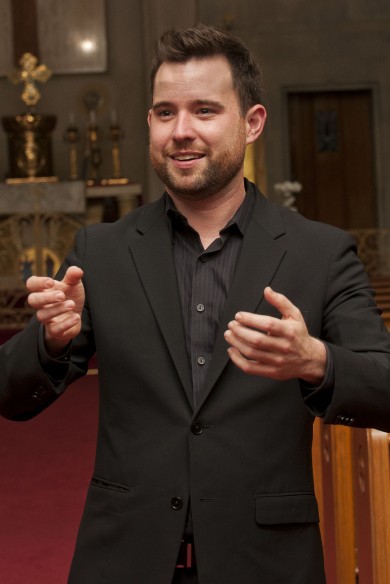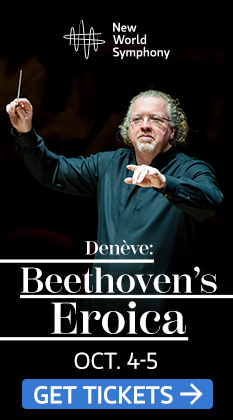Seraphic Fire’s truncated “Messiah” shines in choral highlights

Patrick Dupre Quigley led Seraphic Fire in Handel’s “Messiah” Friday night in Boca Raton.
Seraphic Fire shortened an 18th-century oratorio to conform to 21st-century attention spans, as the chorus opened its Christmas season series of performances of Handel’s Messiah Friday night in Boca Raton.
Solo numbers in particular were removed, with about half of Part II and most of Part III missing, exacting a cost in this Messiah’s cumulative weight and breadth. But what remained was performed with style, a warm tonal sheen and rhythmic drive, giving a rousing account of this setting of texts from the King James Bible and Book of Common Prayer.
Although there were several distinguished solo turns, the glory of the performance was in the choruses. Seraphic Fire’s artistic director, Patrick Dupré Quigley arranged the 17 singers as a double chorus, one to his right, the other to his left, giving the performance a kinetic, stereophonic quality as themes almost visibly bounced from one chorus to the other. Assisting were the clear acoustics of the handsome, contemporary, red-brick interior of St. Gregory’s Episcopal Church, located next to Mizner Park.
In the choruses And the glory of the Lord and And He shall purify, the singing carried a joyful energy, with diction so clear that the English words came through without any need for the texts printed in the program. Male and female voices took turns with the melody of For unto us a child is born, with each taking up the fast-running accompaniment, in the sort of display of choral virtuosity that marked the whole performance.
Although textures were light and tempos fleet, in keeping with the work’s affirmative tone, the performance never felt hurried. And Quigley slowed things down for the more somber passages, such as the dark, quiet harmonies at the end of All we like sheep have gone astray and Since by man came death.
The audience rose for the famous Hallelujah chorus, following a tradition said by legend to go back to George II’s decision to stand at that moment during the work’s London premiere. While this chorus, one of those bits of classical music that almost everyone knows, can come off as a crude, blaring blast of sound, it didn’t do so here. Under Quigley’s leadership, the chorus’ power came through not through volume but through rhythmic drive, tonal brightness and perfectly balanced musical forces, as trumpets, drum, chorus and the rest of the musicians came together for a stirring portrayal of spiritual joy.
Among soloists, a highlight was the tenor Steven Soph in Thou shalt break them, an urgent, forward-leaning performance, with an aggressive style that matched the text and with no sacrifice of tonal beauty in his smooth, agile singing.
Although the Firebird Chamber Orchestra’s violins still played out of tune in some exposed passages—a constant weakness in this ensemble—-the orchestra did an effective job supporting the chorus, with particularly strong work by oboists Rick Basehore and James Riggs, positioned in front to allow their prominent parts to come through.
Seraphic Fire will repeat Messiah 8 p.m. Saturday at First United Methodist Church of Coral Gables and 4 p.m. Sunday at All Saints Episcopal Church in Fort Lauderdale. seraphicfire.org; 305-285-9060.
Posted in Performances
Leave a Comment
Sat Dec 21, 2013
at 12:12 pm
No Comments
